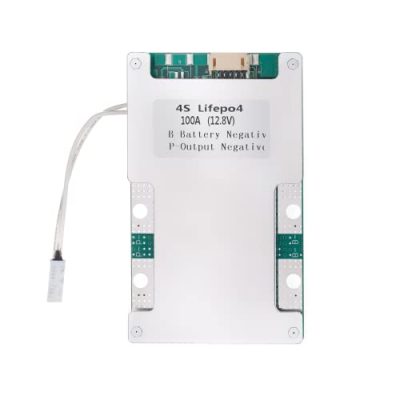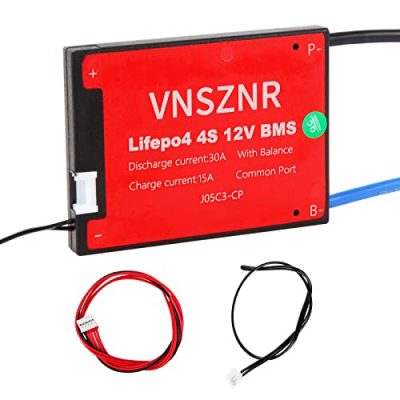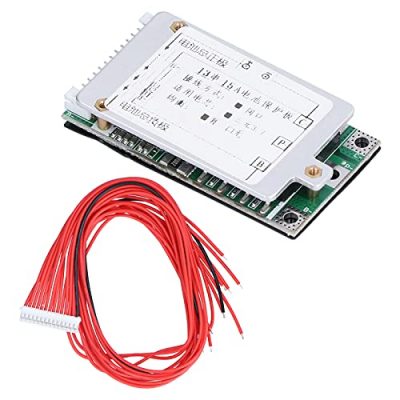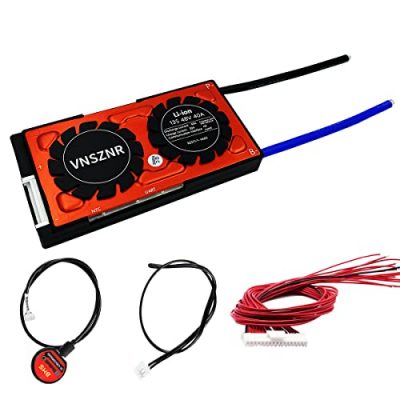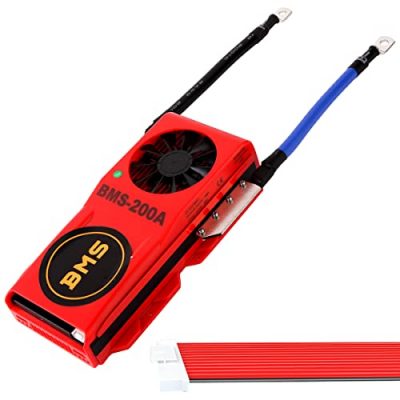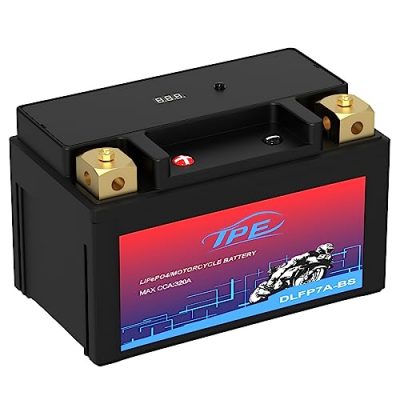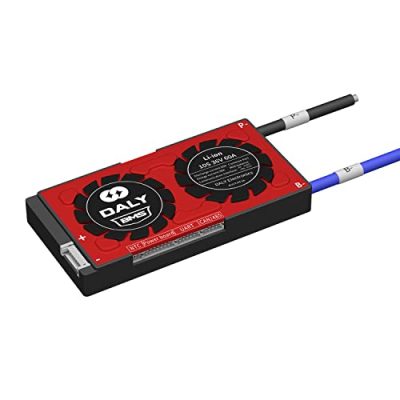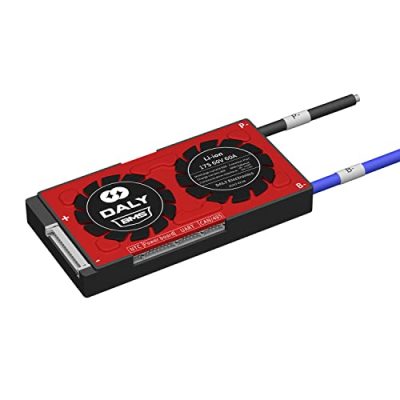Introducing the "12 Best Battery Management System For 2023." Are you in search of the perfect battery management system to optimize the performance and lifespan of your batteries? Look no further! In this article, we will guide you through the top 12 battery management systems available in 2023. Whether you need a BMS for your electric vehicle, renewable energy storage, or other applications, we have got you covered. Stay tuned to discover the technology, features, and benefits offered by these cutting-edge BMS solutions.
The Gloyuda BMS 4S 12.8V 100A lifepo4 Battery Management System provides comprehensive protection for solar energy storage system battery packs. It offers a range of functions such as overcharge protection, over discharge protection, over current protection, short-circuit protection, temperature protection, and more. The lifepo4 battery supports charging and discharging in different voltage and current zones, with low temperature protection down to -20°C and high temperature protection up to 70°C. The BMS is built with high-quality components and features a double-sided PCB circuit board for enhanced durability. It also offers support for customization and special requirements.
Key Features
Specifications
Pros
Cons
The Gloyuda BMS 4S 12.8V 100A Battery Management System is a reliable choice for solar energy storage system battery packs. With its comprehensive protection features and support for different voltage and current zones, it ensures the safety and longevity of your batteries. The high-quality components and durable construction provide peace of mind in terms of reliability. Additionally, the option for customization allows for tailored solutions to meet specific requirements. Overall, this BMS offers great value and performance for solar energy storage applications.
The VNSZNR LiFePO4 BMS is a high-quality battery management system that ensures the long cycle service life of your battery pack. With features like overcharge protection, over-discharge protection, temperature protection, and more, this BMS provides multiple layers of protection for your battery. It uses high anti-corrosion, water resistance, and high impedance ESD conformal coating, making it waterproof, dustproof, and shockproof. The BMS comes with a balance cable, English user manual, B- and P- cables, and a 36-month warranty. It is ISO, FCC, RoHS, PSE, and CE approved, offering quality assurance. The VNSZNR LiFePO4 BMS is the perfect choice for those looking to protect and manage their LiFePO4 battery pack.
Key Features
Specifications
Pros
Cons
The VNSZNR LiFePO4 BMS is a reliable and durable battery management system that offers excellent protection for your LiFePO4 battery pack. With its high-quality construction and multiple safety features, you can trust this BMS to keep your battery safe and maximize its lifespan. The waterproof and shockproof design adds further durability, making it suitable for various applications. However, some users have reported issues with the length and thinness of the battery wires, as well as the lack of clear instructions for connection and the limited availability of the Android app. Overall, if you’re looking for a dependable BMS to safeguard your LiFePO4 battery pack, the VNSZNR LiFePO4 BMS is worth considering.
The Battery Management Systems for Large Lithium Ion Battery Packs is a comprehensive book that provides complete descriptions of BMS and various Lithium battery types. It offers valuable technical information on large Lithium batteries and the required BMS to monitor and control them. The book covers reviews of commercial BMSs and even guides readers on how to build their own BMS. While some readers found it to be a valuable resource, others criticized it for being too general or lacking technical depth. The book is recommended for electric vehicle owners and DIY enthusiasts. It contains interesting sections on SOC measurement methods and balancing methods, but may not be suitable for professional engineers. Overall, it receives a rating of 4.2/5.
Key Features
Specifications
Pros
Cons
The Battery Management Systems for Large Lithium Ion Battery Packs is a valuable resource for electric vehicle owners and DIY enthusiasts who want to understand and implement BMS for their batteries. It offers detailed descriptions and guidance on various aspects of BMS, including battery types and functionality. While it may lack technical depth for professional engineers, it serves as a good introduction for hobbyists. The book provides interesting sections on SOC measurement and balancing methods, although some readers found it too general. Overall, it is a recommended read for those interested in the topic.
The 48v BMS 13s Battery Management System is an essential component for managing and protecting your lithium-ion battery module. It is compatible with 13 cell lithium-ion batteries, including ternary 3.7V batteries, manganese acid batteries, and cobalt acid batteries. The BMS provides multiple protection features, such as overcharge protection, discharge protection, short circuit protection, and temperature control protection. With its aluminum alloy construction, it ensures durability and a long service life. Whether you need it for electric vehicles, scooters, inverters, or other applications, this BMS is designed to meet your needs. The package includes the BMS and a cable for convenient installation.
Key Features
Specifications
Pros
Cons
With its comprehensive protection features, wide compatibility, and durability, the 48v BMS 13s Battery Management System is a reliable choice for anyone in need of a battery management solution. Its versatility makes it suitable for various applications, providing peace of mind and ensuring the safety of your battery. The package includes the necessary cable for easy installation. Overall, this BMS offers great value for its price and is highly recommended for those seeking reliable battery protection and management.
Battery Management Systems, Volume II: Equivalent-Circuit Methods is a comprehensive resource for those interested in Li-Ion battery modeling and state of charge (SoC) estimation. It provides a clear and concise understanding of these complex concepts, making it a valuable tool for students writing theses or professionals in the battery industry. This book, along with its companion Volume I (Battery Modelling), offers an in-depth exploration of battery management systems and algorithms. Written by Gregory Plett, an expert in the field, this book is highly recommended for engineers and anyone working with batteries and complex algorithms. The practical applications discussed in the book are accompanied by supplementary resources available on Plett's website.
Key Features
Specifications
Pros
Cons
Battery Management Systems, Volume II: Equivalent-Circuit Methods is an excellent resource for anyone interested in gaining a deep understanding of Li-Ion battery modeling and state of charge estimation. The book’s clear and concise presentation, accompanied by practical applications, make it a valuable tool for students writing theses or professionals in the battery industry. Gregory Plett’s expertise in the field shines through the book, making it an authoritative and reliable resource. The supplementary resources available on the author’s website further enhance the learning experience. Whether you’re an engineer working on battery management systems or simply curious about Li-Ion batteries, this book is highly recommended.
Battery Management Systems Vol 1 is an in-depth guide to understanding battery management systems, specifically focusing on Li-Ion battery modeling and state of charge estimation. Written by Gregory Plett, a renowned expert in the field, this book offers clear and concise explanations of complex concepts, making it accessible to both researchers and industry professionals. The book also provides supplementary resources on the author's website, including lecture notes and videos, enhancing the learning experience. With its comprehensive coverage and user-friendly approach, Battery Management Systems Vol 1 is a valuable resource for anyone involved in Li-Ion battery modeling or looking to expand their knowledge in this area.
Key Features
Specifications
Pros
Cons
Battery Management Systems Vol 1 is a must-have resource for those interested in understanding and mastering Li-Ion battery modeling. With clear explanations, helpful examples, and supplementary resources, it provides a comprehensive and accessible look into this complex field. While it may require a university-level background to fully grasp certain concepts, the book’s overall value and usefulness cannot be overlooked. Whether you’re working on a thesis, involved in the battery industry, or simply curious about Li-Ion batteries, Battery Management Systems Vol 1 is an excellent investment for expanding your knowledge and gaining a deeper understanding of battery management systems.
The VNSZNR Lithium Battery BMS Bluetooth 48V 40A 13S is a powerful Li-ion battery management system with multiple protection features. It ensures safe and efficient charging and discharging of the battery pack. The BMS has over-charge, over-discharge, over-current, temperature, disconnect, and short circuit protection. Its heavy-duty construction makes it waterproof, dustproof, and shockproof. With a dimension of 5.00Lx2.59Wx0.70H, this BMS is compact and easy to install. It comes with a 36-month warranty and excellent customer service. The VNSZNR Lithium Battery BMS is ISO/FCC/RoHS/PSE/CE approved, guaranteeing its quality and reliability.
Key Features
Specifications
Pros
Cons
The VNSZNR Lithium Battery BMS Bluetooth 48V 40A 13S is a reliable and durable battery management system for DIY lithium battery packs. It offers excellent protection features, ensuring the safety of the battery pack during charging and discharging. The compact size and easy installation make it convenient for use in various applications. Additionally, the 36-month warranty and quality guarantee provide peace of mind to users. Overall, this BMS is a worthy investment for anyone looking to build a reliable and efficient lithium battery pack.
The Robust Battery Management System Design with MATLAB® is an essential guide for engineers and researchers working on battery management systems. With MATLAB® as the primary tool, this book provides comprehensive coverage of battery management system design, including modeling, state estimation, and control algorithms. It offers practical examples and case studies that demonstrate the applications of the techniques discussed. Whether you are a student, an engineer, or a researcher, this book will enhance your understanding of battery management systems and help you design more efficient and reliable systems.
Key Features
Specifications
Pros
Cons
The Robust Battery Management System Design with MATLAB® is a highly recommended resource for anyone involved in battery management system design. Its comprehensive coverage, practical examples, and utilization of MATLAB® make it a valuable tool for engineers, researchers, and students. The book provides insights and techniques to enhance the efficiency and reliability of battery management systems, contributing to the development of advanced energy storage technologies. Whether you are a novice or an experienced professional, this book will expand your knowledge and serve as a reliable reference in the field of battery management system design.
The LiFePO4 BMS is a high-quality battery management system designed for DIY LiFePO4 3.2V battery cells. It features a durable construction with corrosion-resistant, water-resistant, and shock-resistant properties. The BMS provides multiple protection functions, including overcharge protection, overdischarge protection, overcurrent protection, and short circuit protection. It also offers a balance function with a balance current of 30mA. The BMS is compatible with 3.2V LiFePO4 cells and has a discharge voltage range of 2.5V to 3.65V. Optionally, a Bluetooth BMS with temperature protection is available. Customers can select the appropriate BMS based on their load and battery pack specifications. The product comes with a 12-month warranty and excellent customer service.
Key Features
Specifications
Pros
Cons
The LiFePO4 BMS 16S 48V 200A Battery Management System is a reliable and durable solution for DIY LiFePO4 battery packs. Its high-quality construction ensures long cycle life, while the multiple protection functions safeguard against common battery issues. The BMS is easy to use and can be adjusted via Bluetooth for temperature protection. The corrosion resistance, water resistance, and shock resistance make it suitable for various environments. The 12-month warranty and excellent customer service provide peace of mind to customers. The only drawback is that some customers reported the connectors for Bluetooth being welded shut, limiting the ability to view or change settings. Overall, the LiFePO4 BMS is a dependable choice for those looking to optimize the performance and lifespan of their LiFePO4 battery cells.
The TPE Lithium Motorcycle Scooter Battery is a high-performance lithium battery designed for motorcycles and scooters. With a lifespan of 8 to 10 years and a lightweight design, this battery offers excellent performance and durability. It features a built-in BMS (Battery Management System) that protects the battery from various hazards such as overcharging and overheating. The use of lithium batteries also contributes to environmental protection. This battery is compatible with various motorcycle models and can also be used as a starter for small motorcycles. TPE provides a one-year warranty and excellent after-sales service. If you're looking for a reliable and long-lasting motorcycle battery, the TPE Lithium Motorcycle Scooter Battery is a great choice.
Key Features
Specifications
Pros
Cons
The TPE Lithium Motorcycle Scooter Battery is a reliable and durable option for motorcycle enthusiasts. Its long lifespan and lightweight design make it a convenient choice for riders. The built-in BMS ensures the safety of the battery and extends its performance life. However, there have been a few reports of the battery not holding a charge and some shipping issues. Overall, if you’re looking for a high-performance lithium motorcycle battery with excellent after-sales service, the TPE Lithium Motorcycle Scooter Battery is worth considering.
The DALY Smart BMS Li-ion 10S 36V 60A PCB Battery Management System is a high-quality and reliable battery monitoring module for lithium battery packs. With its smart communication function CAN protocol, you can easily view and monitor all the parameters in real-time through the Bluetooth app or UART USB connection. The parameters such as charge and discharge protection current, voltage, and temperature can also be programmable within a certain range. The BMS also features an alarm reminder to alert you of any negative effects on the battery caused by factors like temperature, voltage, or current. It comes with a complete package including the Smart BMS, Bluetooth module, matching balance wire, temperature sensor, and instruction manual.
Key Features
Specifications
Pros
Cons
The DALY Smart BMS Li-ion 10S 36V 60A PCB Battery Management System offers a convenient and efficient solution for monitoring and protecting lithium battery packs. Its smart communication function allows for real-time parameter view and programmable settings, while the alarm reminder ensures timely alerts for potential battery issues. The BMS is backed by quality certifications and comes with all the necessary components. However, there have been reports of possible battery damage and reliability concerns with some units. Overall, if used correctly and with caution, this BMS can greatly enhance the safety and performance of your lithium battery pack.
The DALY Smart BMS Li-ion 17S 60V 60A PCB Battery Management System is a powerful device designed for monitoring and managing lithium battery packs. It features a Smart Communication Function with CAN Protocol, allowing users to view all parameters in real time using a Bluetooth app or a UART USB connection with a PC monitoring program. The BMS also offers programmable charge and discharge protection for customizable settings within a certain range. In addition, it includes an alarm reminder system that displays warnings on the Bluetooth app or PC program when factors like temperature, voltage, or current negatively affect the battery. With ISO, FCC, RoHS, PSE, and CE approvals, the DALY Smart BMS Li-ion 17S 60V 60A PCB Battery Management System guarantees quality and comes with a comprehensive package of accessories, including a Bluetooth module, matching balance wire, temperature sensor, and instruction manual.
Key Features
Specifications
Pros
Cons
The DALY Smart BMS Li-ion 17S 60V 60A PCB Battery Management System is a reliable and versatile solution for monitoring and managing lithium battery packs. With its Smart Communication Function, users can easily view real-time parameters through either Bluetooth or USB connection. The programmable charge and discharge protection further enhance the customization options. The alarm reminder system adds an extra layer of safety by notifying users of any negative effects on the battery. With ISO, FCC, RoHS, PSE, and CE approvals, customers can trust the quality of this product. Additionally, the comprehensive package of accessories ensures that users have everything they need for smooth battery management. Despite potential delivery delays during national holidays, this BMS is a great investment for those seeking efficient and reliable lithium battery monitoring and management.
Buyer's Guide: Battery Management System
Discover the essentials of a battery management system with this comprehensive buyer's guide. Whether you're a novice or experienced buyer, these bullet points will provide you with valuable insights and tips to make an informed purchasing decision.
Benefits of a Battery Management System (BMS)
- Enhanced Battery Performance: BMS optimizes battery efficiency, prolonging battery life and increasing overall performance.
- Safety Assurance: BMS ensures safe operation by monitoring critical battery parameters like voltage, temperature, and current.
- Fault Detection and Prevention: BMS identifies potential issues early on, preventing battery failures and damage.
- Improved Battery Pack Integration: BMS enables seamless integration of the battery pack with other hardware, enhancing overall system reliability.
Key Considerations for Choosing a Battery Management System
When selecting a BMS, keep the following factors in mind to ensure the best fit for your requirements:
- Battery Type Compatibility
- Verify that the BMS is compatible with the specific battery type you are using, such as lithium-ion, lead-acid, or nickel-cadmium.
- System Voltage Requirements
- Consider the system's voltage requirements and ensure that the BMS supports the desired voltage range.
- Expandability and Scalability
- If you anticipate future expansion or modifications to your battery system, choose a BMS that allows for easy scalability and integration with additional battery packs.
- Monitoring and Control Features
- Look for a BMS with comprehensive monitoring and control functionality, including real-time data monitoring, state-of-charge estimation, and customizable alerts.
- Safety Features
- Ensure that the BMS offers essential safety features such as overcharge and over-discharge protection, short-circuit detection, and thermal management.
- Communication Protocols
- Consider the compatibility of the BMS communication protocols with your system requirements, such as CAN (Controller Area Network), SMBus, or RS-485.
- User Interface and Visualization
- Evaluate the user interface and visualization capabilities of the BMS software or hardware display to ensure ease of use and accessibility of battery data.
- Integration with Battery Chargers
- If using battery chargers, confirm compatibility and integration capabilities between the BMS and chargers to enable seamless charging and monitoring.
- Availability of Technical Support and Documentation
- Check if the manufacturer provides reliable technical support and comprehensive documentation for installation, troubleshooting, and maintenance.
- Overall Cost and Budget
- Consider your budgetary constraints while evaluating different BMS options. Remember to include the required accessories and software licenses in your cost assessment.
- Compatibility with Other System Components
- Ensure that the BMS is compatible with other system components, such as inverters, solar charge controllers, or motor controllers, for smooth integration and operation.
Frequently Asked Questions (FAQs)
Q: What is a battery management system (BMS)?
A: A BMS is an electronic system that manages and monitors rechargeable batteries, ensuring their optimal performance, safety, and longevity.
Q: Why is a BMS important?
A: A BMS is crucial because it safeguards the battery, maximizes its efficiency, and alerts the user about any issues or risks, providing peace of mind and extending battery lifespan.
Q: Can a BMS protect batteries from overcharging and over-discharging?
A: Yes, a BMS actively regulates the charging and discharging process, protecting batteries from overcharging and over-discharging, which can significantly impact their lifespan and safety.
Q: How does a BMS improve battery pack integration?
A: By effectively managing battery cell balancing, state-of-charge estimation, and data communication, a BMS ensures seamless integration of individual battery cells into a cohesive and reliable battery pack.
Q: Can I use any BMS for any battery type?
A: No, each BMS is designed to be compatible with specific battery chemistries, so it is essential to choose a BMS that supports the battery type you are using or planning to use.
Q: Is it necessary to have real-time data monitoring in a BMS?
A: Real-time data monitoring is highly beneficial as it allows you to observe battery performance, detect potential issues promptly, and take necessary actions to optimize battery utilization and longevity.
Q: Can a BMS prevent battery failures?
A: Yes, a BMS can detect and prevent battery failures by continuously monitoring parameters such as voltage, temperature, and current, enabling early identification of potential issues and taking appropriate action.
Q: Are there different communication protocols used in BMS?
A: Yes, BMS can use various communication protocols like CAN, SMBus, or RS-485, facilitating communication between the BMS and other system components, such as chargers or monitoring systems.
Q: How can I ensure an accurate state-of-charge estimation with a BMS?
A: By monitoring battery voltage, current, and temperature variations over time, a BMS employs advanced algorithms to estimate the battery’s state of charge, providing an accurate representation of remaining battery capacity.
Q: Can a BMS help increase the lifespan of batteries?
A: Yes, a BMS optimizes battery charging and discharging processes, prevents overcharging and over-discharging, and ensures balanced cell voltages, all of which contribute to extending battery life.
Q: Do I need technical expertise to install and use a BMS?
A: While basic technical knowledge is beneficial, many BMS manufacturers offer comprehensive installation guides and user manuals, making it accessible to users with varying levels of technical proficiency.
Q: Are there any certifications or standards to consider for a BMS?
A: Yes, certifications like ISO 26262 (functional safety for automotive applications) or IEC 62133 (safety requirements for portable sealed rechargeable cells) can indicate compliance with specific industry standards and safety regulations.

